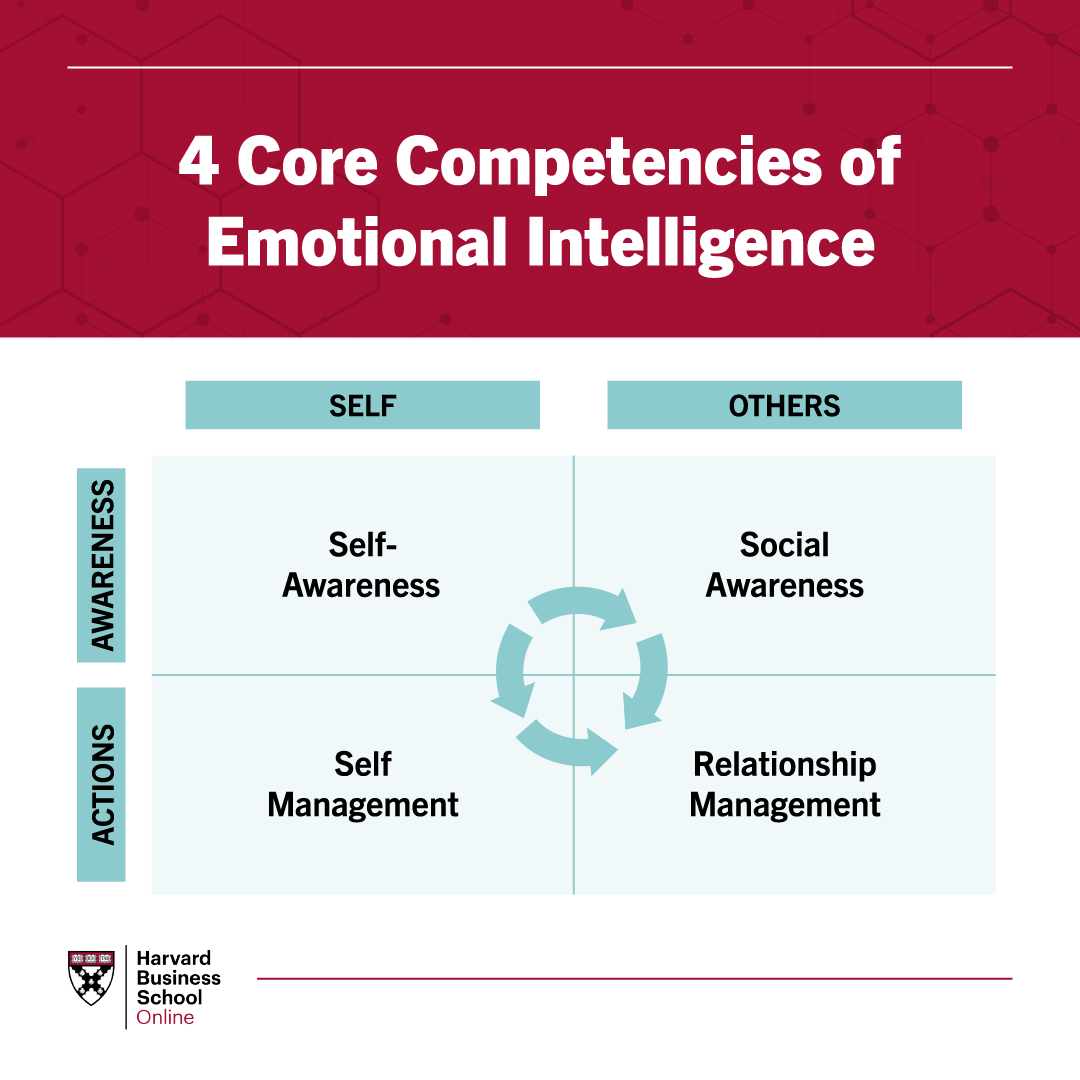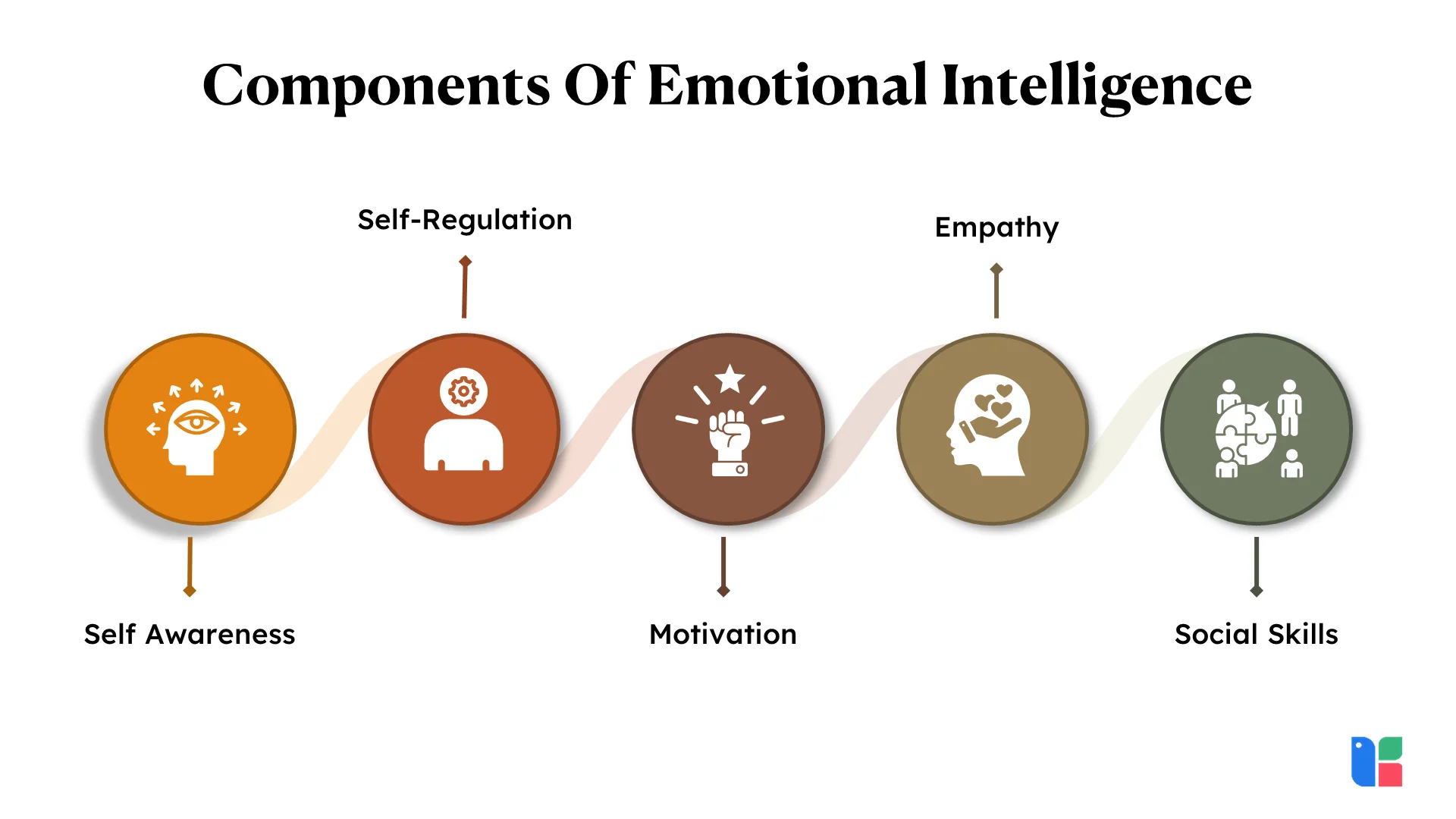What is Emotional Intelligence?
Definition of Emotional Intelligence
Emotional Intelligence (EI) refers to the ability to recognize, understand, and manage our own emotions while effectively recognizing, understanding, and influencing the emotions of others. Daniel Goleman, a renowned psychologist, popularized the concept and emphasized that emotional intelligence is equally as vital as traditional cognitive intelligence—or even more so—in various aspects of life, especially in the workplace. Goleman’s work highlights that emotionally intelligent individuals tend to have stronger relationships, perform better at work, and adapt more easily to change. Discover more about the origins and theory of emotional intelligence by visiting MindTools.
Components of Emotional Intelligence
Emotional Intelligence is fundamentally made up of five key components that play a crucial role in determining an individual’s EI level:
- Self-Awareness: Being self-aware means having a deep understanding of your emotions, strengths, weaknesses, values, and motives. It involves recognizing how your emotions affect your thoughts and behavior and how they influence those around you. Self-awareness is the foundation for personal and professional growth.
- Self-Regulation: This involves the ability to control or redirect disruptive emotions and impulses and adapt to changing circumstances. People with strong self-regulation can handle stress without lashing out and remain composed even in challenging situations.
- Motivation: Emotionally intelligent individuals are often driven by intrinsic motivation, pursuing goals with energy and persistence. They are typically more productive and effective, as they tend to focus on long-term success over immediate rewards.
- Empathy: Perhaps one of the most significant aspects, empathy is the ability to understand and share the feelings of others. This component allows you to build strong, enduring relationships and respond to others genuinely and sensitively.
-
Social Skills: As a culmination of the other components, social skills pertain to managing relationships to move people in desired directions. Effective communication, conflict resolution, and collaboration are hallmarks of those with strong social skills.
In the professional sphere, nurturing these components of emotional intelligence can lead to more cohesive and successful teams. Investing in developing these skills not only contributes to personal development but significantly enhances workplace dynamics. By understanding and implementing these components, organizations can create a more emotionally intelligent and harmonious environment, leading to increased productivity and employee satisfaction.
For more insights on enhancing your emotional intelligence in the workplace, visit Harvard Business Review.
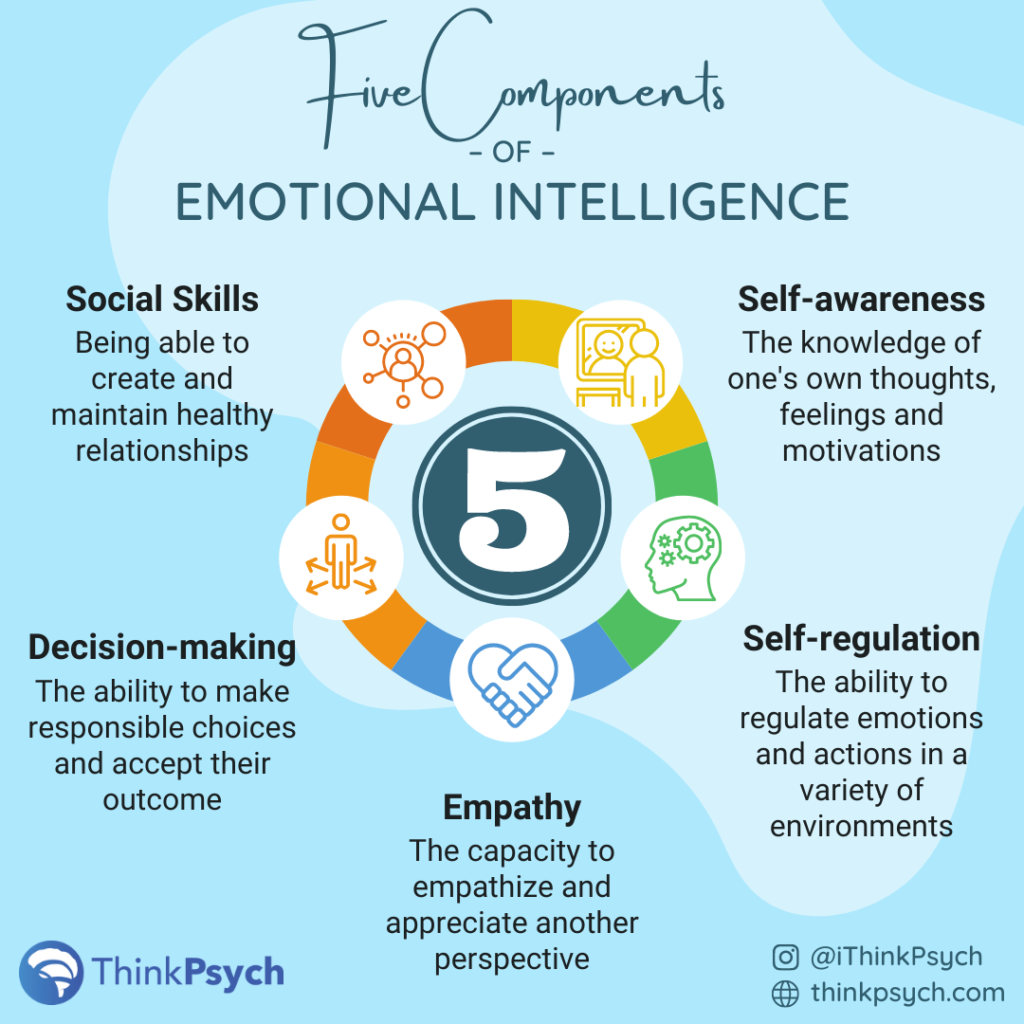
Why is Emotional Intelligence Important in the Workplace?
Impact on Workplace Productivity
Emotional intelligence (EI) plays a crucial role in enhancing workplace productivity by fostering an environment where employees can work optimally. Individuals with high emotional intelligence are adept at managing their emotions, which helps in minimizing workplace stress and reducing burnout. Research has demonstrated that organizations where emotional intelligence is prioritized witness increased efficiency, as teams collaborate more effectively and decision-making processes become more inclusive and effective.
Employees who understand and regulate their emotions are better equipped to adapt to changes and solve problems creatively. This adaptability fuels innovation, allowing teams to deliver results more swiftly and accurately. Moreover, emotionally intelligent employees can identify and manage workplace conflicts constructively, leading to a harmonious work environment and paving the way for substantial productivity gains.
Enhancing Employee Relationships
The ability to empathize and communicate effectively is pivotal in building healthy work relationships. Employees with strong emotional intelligence are attuned to their colleagues’ emotional states, allowing them to foster trust and mutual respect. This emotional attunement facilitates clear communication and reduces misunderstandings, creating a workplace culture where individuals feel valued and understood.
Teams that engage positively tend to have higher morale and are more motivated to meet collective goals. Developing a strong rapport among employees alleviates barriers to collaboration, enhancing teamwork and driving organizational success. As a result, emotionally intelligent employees can transform the workplace into a supportive community where everyone feels a sense of belonging and purpose.
Role in Leadership
Effective leadership hinges significantly on emotional intelligence. Leaders who exemplify high levels of EI can inspire and guide their teams with empathy and confidence. They are capable of recognizing their own emotional cues and those of their team members, allowing them to provide meaningful feedback and support.
By fostering an environment of openness and respect, emotionally intelligent leaders encourage creativity and resilience among their team members. This not only enhances individual performance but also aligns the team towards achieving the organization’s strategic objectives. As outlined by Harvard Business Review, leaders with EI are adept at navigating complex interpersonal dynamics and are pivotal in cultivating a positive organizational culture.
In conclusion, nurturing emotional intelligence within a workplace setting is not merely beneficial but essential for achieving sustained success. Whether through improved productivity, enhanced relationships, or effective leadership, the impact of emotional intelligence is profound and far-reaching, laying the foundation for an engaged and thriving workforce.
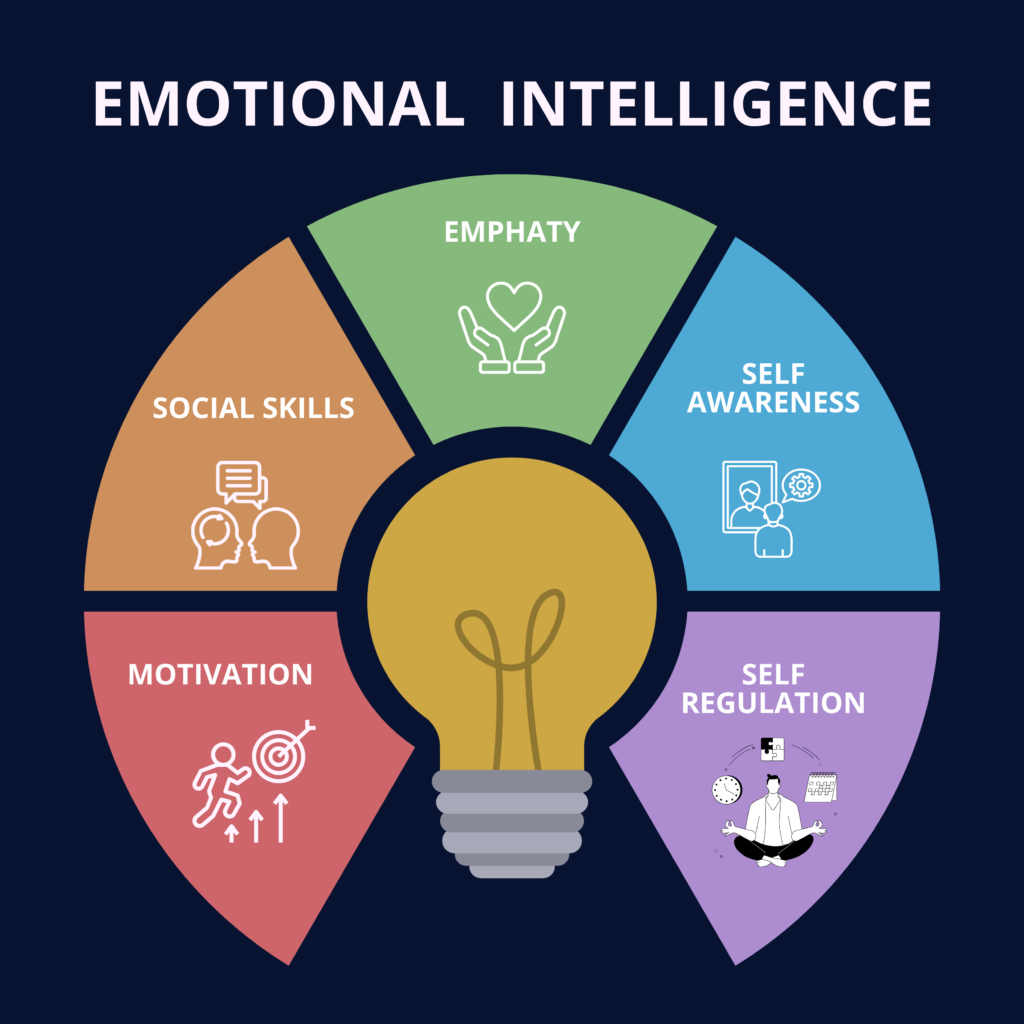
Key Skills of Emotional Intelligence
Self-Awareness
Self-awareness acts as the foundation of emotional intelligence, fostering a robust platform for personal and professional growth. It is the ability to recognize and understand one’s emotions, drives, and effects on others. This key skill not only enhances personal performance but also aids in career advancement. Leaders with high self-awareness are often more adaptable to change and can handle failure with grace, contributing to a dynamic and resilient workplace environment.
At its core, self-awareness involves paying attention to evaluating your emotional state, strengths, weaknesses, values, and motivations. This understanding allows employees to communicate effectively, build trust, and foster a collaborative atmosphere. As a result, self-awareness can significantly improve decision-making processes and fuel creative problem-solving approaches.
Self-Regulation
The skill of self-regulation empowers individuals to control or redirect disruptive emotions and impulses. Employees who master self-regulation tend to keep calm under pressure, act with integrity, and picture a positive outlook even during challenging situations. This aspect of emotional intelligence is crucial for those in leadership roles, where everything from unexpected setbacks to interpersonal conflicts needs to be managed with a steady hand.
For self-regulation to thrive in the workplace, individuals need to practice mindfulness and stress management techniques. This involves recognizing personal triggers and developing strategies to mitigate anxiety and overreaction. Mindful self-regulation also includes being open to change and innovation without undue stress, thereby tailoring the workplace towards efficiency and productivity (Harvard Business Review).
Social Skills
Essential to emotional intelligence is the development of excellent social skills. In a diverse workplace, fostering healthy interpersonal relationships is paramount. Employees with strong social skills are effective communicators, whether guiding meetings, initiating conversations, or resolving conflicts amongst team members. This skill can directly impact workplace dynamics by nurturing a culture of open dialogue and mutual respect.
Furthermore, social skills facilitate effective collaboration and team harmony, critical during group tasks and cross-departmental projects. By utilizing active listening, empathy, and nonverbal communication cues, emotionally intelligent individuals break down barriers and drive collective success. The ability of these individuals to navigate social complexities makes them indispensable, often paving the way for transformation within the organization (Psychology Today).
In conclusion, these key skills of emotional intelligence—self-awareness, self-regulation, and social skills—form a triad that can profoundly reshape how employees interact within the workplace. Understanding and harnessing these abilities can lead to a more cohesive, motivated, and successful work environment.
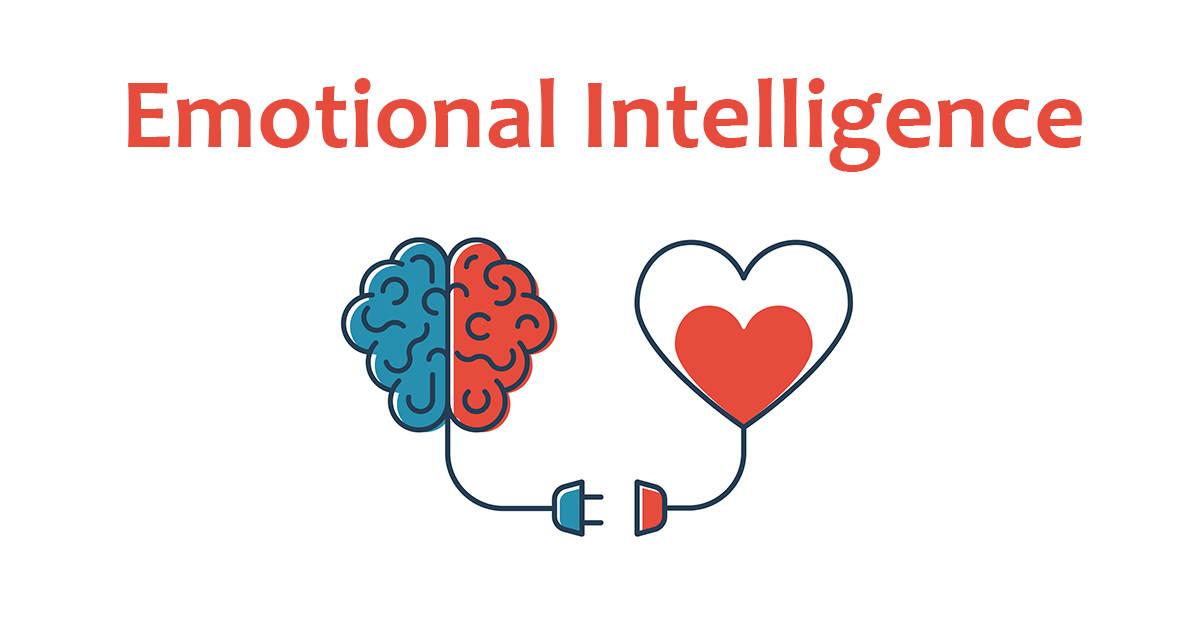
Developing Emotional Intelligence in the Workplace
Training Programs
Incorporating emotional intelligence (EI) training programs within the workplace can significantly enhance employees’ capacity to empathize, communicate effectively, and navigate interpersonal challenges. These programs often include workshops and seminars designed to teach employees about the core components of emotional intelligence, such as self-awareness, self-regulation, empathy, and social skills. By developing these skills, employees can create a harmonious workplace environment, reduce workplace conflicts, and increase overall productivity.
Training programs should be tailored to fit the unique needs of an organization. For example, interactive role-playing activities and simulation exercises are effective methods for helping employees understand different emotions and reactions. Investing in comprehensive EI training can also lead to enhanced employee satisfaction and reduced turnover rates, as staff members feel more valued and understood. A study highlighted in Forbes indicates that organizations focusing on EI training see marked improvements in their team dynamics and conflict resolution capabilities.
Coaching and Mentorship
Beyond structured training, coaching and mentorship play an essential role in cultivating emotional intelligence within the workplace. Personalized coaching and mentorship provide employees with one-on-one guidance to refine their EI skills in real-world situations. Through regular feedback and continued support, employees learn to recognize and manage their emotions more effectively, improving both their personal and professional relationships.
Mentorship programs can be particularly beneficial for leaders and managers. By enhancing their emotional intelligence, they are better equipped to inspire and motivate their teams, driving the organization towards greater success. These programs can include goal-setting sessions, reflection practices, and stress management techniques, all aimed at fostering a supportive and emotionally intelligent workplace culture.
An organization that prioritizes coaching and mentorship not only invests in its immediate workforce but also sets the foundation for sustainable business success. According to the Harvard Business Review, mentorship initiatives lead to a more engaged and committed workforce, with individuals ready to take initiative and embrace challenges.
To achieve the full benefits of emotional intelligence in the workplace, businesses should integrate both structured training programs and personalized coaching. By doing so, they can ensure their teams are equipped with the necessary skills to thrive in a dynamic and competitive work environment.
In the ever-evolving landscape of modern workplaces, the integration of emotional intelligence is not just a trend but a foundational component for achieving enduring success. By understanding and harnessing the power of emotional intelligence, organizations and individuals alike can navigate the complexities of human interactions more effectively, fostering an environment that encourages growth, collaboration, and innovation.
A workplace enriched with emotional intelligence is marked by increased productivity and a harmonious atmosphere. Employees who possess strong emotional intelligence are better equipped to manage their own emotions and understand those of their colleagues. This capability reduces conflicts, enhances communication, and builds resilience against workplace stress. Ultimately, it cultivates a positive work environment where teamwork thrives and goals are more easily attained.
Leadership in particular benefits significantly from embracing emotional intelligence. Leaders who demonstrate emotional intelligence are more adept at inspiring and motivating their teams, recognizing the individual needs of their employees, and adapting their leadership style to suit various situations. This adaptability not only propels the leader’s success but also elevates team performance and satisfaction.
Moreover, emotional intelligence stands as a cornerstone for cultivating deep employee relationships. When employees feel understood and valued, their commitment to their work and the organization strengthens. As highlighted by Harvard Business Review, leaders who integrate emotional intelligence within their approach see notable improvements in team dynamics and organizational culture.
Developing emotional intelligence is not an overnight feat but a journey that requires dedication and purposeful action. Workplace initiatives like targeted training programs, effective coaching, and comprehensive mentorship pave the way for enhanced emotional capabilities. By investing in these areas, organizations position themselves as forward-thinking and better prepared to face the challenges of an ever-competitive business world.
In conclusion, prioritizing emotional intelligence in the workplace is not merely an option but a critical strategy for success. By championing this transformative skill set, both individuals and organizations can create an environment ripe for lasting achievement and personal fulfillment. For further resources on enhancing emotional intelligence, explore our comprehensive guides and insights at WikiSearch.
